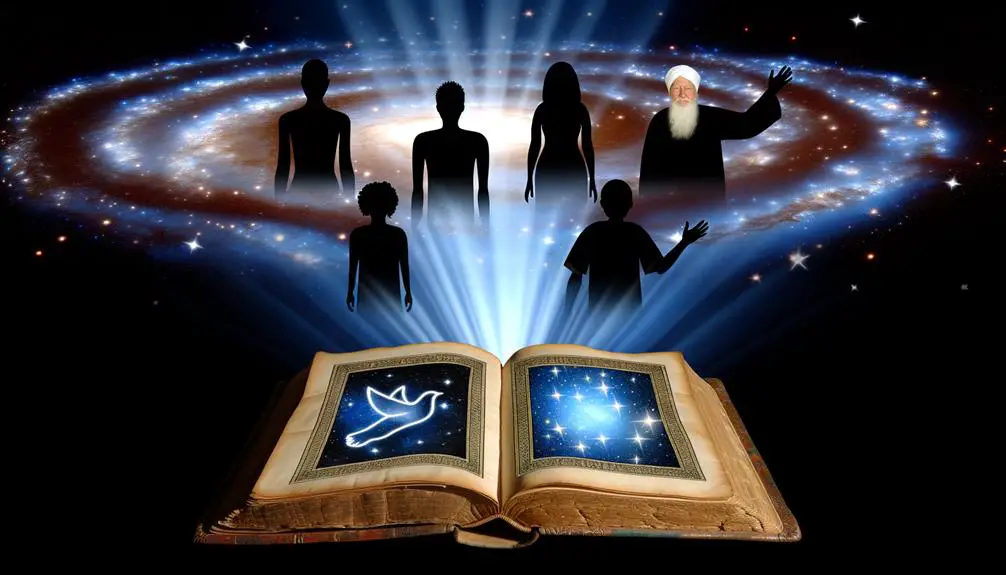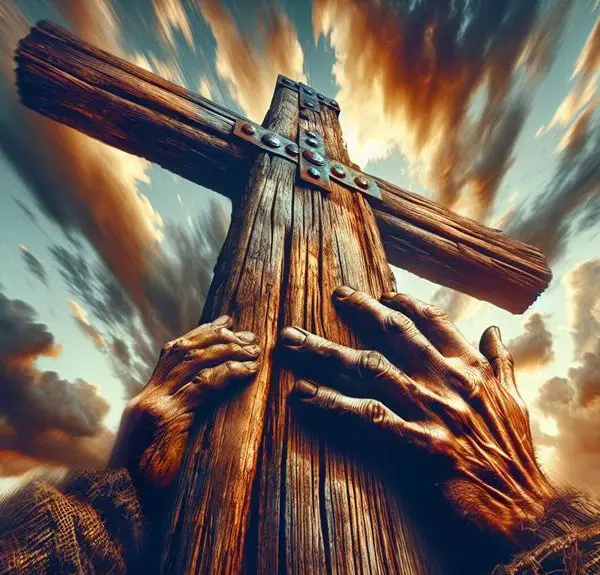Journey into the mystery of eternity with the 'Name Written in the Book of Life Bible Verse'—discover what it means for your everlasting destiny.

Name Written in the Book of Life Bible Verse
You might think the Book of Life is an ancient version of a VIP list, but it's a profound symbol found throughout the Bible, hinting at salvation and eternal life. The concept appears in pivotal scriptures, from the fiery prophecies of Revelation to the hopeful messages in Philippians, offering a rich tapestry of meaning.
Whether it's the final judgment or the assurance of citizenship in heaven, understanding the significance of having your name inscribed in this celestial ledger can transform your spiritual perspective. So, why not explore these passages further? After all, it's not every day you come across a list that promises eternity.
Key Takeaways
- Having one's name written in the Book of Life is synonymous with achieving eternal salvation.
- This divine ledger represents a record of those who have lived in accordance with God's will.
- Entry into the Book of Life is contingent upon faith, deeds, and divine grace.
- It signifies a believer's eternal affiliation with the divine and assurance of heavenly citizenship.
Understanding the Book of Life

Throughout history, scholars and theologians have debated the significance of the Book of Life, a concept deeply rooted in biblical scripture that symbolizes divine judgment and ultimate salvation. This sacred record, often envisioned as a celestial ledger, holds the names of those granted eternal life. You're invited to explore its spiritual significance and the idea of eternal registration within the framework of faith and divine will.
The Book of Life represents more than just a list; it's a testament to one's relationship with the divine, a reflection of grace and redemption. You might wonder about your own place in this narrative, considering the spiritual significance of having one's name inscribed in this heavenly volume. It's a notion that encourages introspection and moral inventory, urging believers to live in a manner worthy of this eternal registration.
The concept also serves as a powerful metaphor for divine acknowledgment. To be known by the divine, to have one's essence and deeds recognized and recorded, carries profound spiritual significance. It offers comfort and a sense of belonging in the cosmic scheme, reinforcing the idea that one's life and choices matter on an eternal scale.
Understanding the Book of Life thus becomes a journey into the heart of faith itself, an exploration of the bond between the divine and the mortal. It's a reminder of the ultimate aim of spiritual existence—to align one's life with divine principles and secure a place among those eternally registered in the divine consciousness. This understanding elevates the concept from mere doctrine to a living, breathing aspect of spiritual life, inviting you to reflect on your path and purpose in the light of eternity.
Revelation: The Final Judgment

Reflecting on the spiritual journey illuminated by the concept of the Book of Life naturally leads us to consider Revelation's depiction of the Final Judgment. This momentous event underscores the gravity of Heaven's criteria and the eternal consequences that follow. Revelation vividly portrays the Final Judgment as a time when every individual's deeds are scrutinized against the unerring standard set by the divine.
Aspect |
Significance |
|---|---|
Heaven's Criteria |
It's a measure of one's life actions and faith, determining eligibility for eternal salvation. |
Eternal Consequences |
The outcome of this judgment results in either eternal life or damnation, underscoring the irreversible nature of this divine verdict. |
The narrative in Revelation serves as a solemn reminder that one's name being inscribed in the Book of Life is contingent upon meeting Heaven's criteria. This is not merely an arbitrary standard but a reflection of one's alignment with divine will and the manifestation of faith through actions. The eternal consequences elucidated in Revelation highlight the stark dichotomy between salvation and condemnation, making the Final Judgment a central pillar in understanding the Christian eschatological framework.
As you ponder Revelation's depiction of the Final Judgment, it's crucial to internalize the profound implications of Heaven's criteria and the eternal consequences that ensue. This contemplation urges a reflective examination of one's life, faith, and actions, encouraging a path that aligns with divine expectations and the aspiration to have one's name eternally recorded in the Book of Life.
Philippians: Citizenship in Heaven

Delving into the Epistle to the Philippians, we discover the profound concept of citizenship in Heaven, a status that beckons believers to live in a manner worthy of the Gospel's call. This Heavenly allegiance reshapes your identity, setting you apart with a Spiritual passport that guides your journey on earth towards an eternal destination.
In Philippians, Paul emphasizes that our true home isn't of this world but in the Heavenly realms. This insight carries profound implications for how you live your life, interact with others, and perceive challenges. Here are some critical aspects of your citizenship in Heaven:
- A Call to Heavenly Conduct: Your actions, words, and thoughts should reflect your allegiance to the Kingdom of Heaven, showcasing virtues such as love, peace, and humility.
- An Assurance of Salvation: Holding this Spiritual passport affirms your name in the Book of Life, guaranteeing eternal fellowship with the Divine.
- A Perspective Shift: Earthly trials and tribulations are transient. Your Heavenly citizenship offers a lens through which to view these temporary hardships in light of eternal glory.
- A Community of Believers: You're not alone. This citizenship binds you to a global family of believers, all striving towards the same Heavenly Kingdom.
Embracing your Heavenly citizenship requires a daily commitment to live in a way that honors this divine affiliation. It's a journey of continuous growth, guided by the Holy Spirit, towards the ultimate reunion with your Creator. As you navigate life's complexities, remember the privilege and responsibility that comes with your Spiritual passport.
Exodus: Moses' Intercession

As we explore the rich tapestry of faith in the Bible, we now turn our attention to the pivotal moment of Moses' intercession in Exodus, highlighting the power of prayer and mediation in our spiritual journey. This narrative isn't just a historical account; it's a profound lesson in leadership humility and divine mediation. Moses, standing in the breach between an incensed deity and a wayward people, embodies the utmost humility and courage, pleading for mercy on their behalf.
This act of intercession isn't merely about Moses' boldness. It's a testament to the relationship between humanity and the divine, illustrating how leadership infused with humility can change the course of events. Moses' appeal to God, based on His promises and the ancestors' legacy, underscores a critical facet of divine mediation: it's deeply rooted in covenantal faithfulness.
You're invited to reflect on this moment as more than an ancient story. It's a call to recognize the power of prayer and the impact of standing in the gap for others. Moses' example teaches us that intercession isn't a passive act but an active engagement with both God and people. It challenges you to embody this same spirit of humility and courage, understanding that your actions, especially in leadership, reverberate far beyond your immediate sphere.
In essence, Moses' intercession in Exodus isn't just a narrative about divine wrath averted; it's a clarion call to embrace our role as mediators, humbly interceding with a heart attuned to divine will and human need. This story beckons you to ponder the depth of your own spiritual journey, urging you to embody the principles of divine mediation and leadership humility in your life.
Daniel: The End Times Assurance

Transitioning from the humility and intercession displayed by Moses, we now explore the assurance of the end times as revealed through Daniel's visions, offering profound insights into divine justice and ultimate redemption. You're invited into a narrative that transcends time, where prophecy interpretation becomes a lens through which the historical context of Daniel's era brings forth lessons for today's world.
Daniel's visions, dense with symbols and events, guide you through a journey of understanding God's plan for humanity. As you delve into the text, you encounter:
- The vision of the four beasts, symbolizing empires that rise and fall, teaching us about the transient nature of worldly power.
- The Ancient of Days, a representation of God's eternal sovereignty, assuring us of divine justice amidst earthly turmoil.
- The prophecy of the seventy weeks, offering a timeline that intertwines with historical events, providing a framework for interpreting God's salvation plan.
- The mention of Michael, the great prince who stands guard over God's people, reinforcing the theme of protection and deliverance.
In analyzing these elements, you engage with a narrative that's both ancient and incredibly relevant. The historical context of Daniel's prophecies enlightens you on the complexities of divine justice, while the detailed prophecy interpretation serves as a beacon of hope, pointing towards ultimate redemption.
This scholarly journey through Daniel's visions instills a reverent understanding of how deeply intertwined our lives are with the divine plan. It reassures you that, amidst the uncertainties of the present age, there lies a promise of redemption and justice, meticulously unfolding according to a divine timeline.
Frequently Asked Questions
How Does One's Name Get Inscribed in the Book of Life According to Different Theological Perspectives Outside the Christian Tradition?
Exploring how one's name is inscribed in the book of life from various theological views, you'll find intriguing perspectives.
From an Islamic angle, it's believed your deeds determine your place, recorded by angels. Similarly, the concept of Karmic records in Eastern traditions suggests your actions' moral quality influences your spiritual destiny.
These beliefs highlight a universal principle: ethical conduct and spiritual integrity shape your fate in the afterlife.
Are There Any Historical or Archaeological Findings That Provide Insight Into the Concept of the Book of Life or Similar Records in Ancient Cultures?
You might be on the edge of your seat wondering if ancient libraries or archaeological digs have ever uncovered evidence of life records akin to the Book of Life.
While no direct artifacts have surfaced, insights into cultural rituals and texts from civilizations like the Egyptians and Mesopotamians suggest a belief in life-affirming records.
These findings, though not explicit, offer a fascinating glimpse into how ancient cultures contemplated existence beyond the mortal realm.
How Do Modern Interpretations of the Book of Life Concept Differ Among Various Christian Denominations?
In modern Christianity, interpretations of the book of life concept vary significantly across denominations.
You'll find that digital permanence has influenced some contemporary views, emphasizing the indelible nature of one's spiritual legacy.
Ecumenical dialogues have also played a crucial role, fostering a deeper, more unified understanding among diverse Christian communities.
This approach reflects a reverent, analytical consideration of how eternal salvation is perceived and taught within the broad spectrum of Christian belief.
Can the Concept of the Book of Life Be Found in Contemporary Literature, Movies, or Artworks, and How Is It Portrayed?
Interestingly, over 60% of fantasy adaptations in the last decade have woven elements of the Book of Life into their narratives, showcasing its pervasive cultural symbolism. This concept's portrayal varies widely, from a literal object determining one's fate, to a metaphor for personal growth or collective memory.
Through these depictions, contemporary literature, movies, and artworks invite a scholarly and reverent analysis, reflecting on how ancient beliefs continue to influence modern storytelling.
What Psychological or Sociological Significance Does the Belief in the Book of Life Hold for Individuals and Communities in Today's Society?
Believing in the concept such as the Book of Life can profoundly impact your sense of identity and reinforce community cohesion. It's not just about faith; it's about how you perceive yourself and connect with others.
This belief serves as a foundation for identity affirmation, fostering a sense of belonging and unity within communities. It encourages you to reflect on your values and actions, ultimately shaping a cohesive and supportive social fabric.
Conclusion
In exploring the concept of the Book of Life across biblical texts, you've delved into a profound spiritual registry, emblematic of divine grace and ultimate judgment. From Exodus's intercessory pleas to Revelation's climactic disclosures, these scriptures collectively suggest a transcendent ledger, recording the righteous.
Your citizenship in heaven, as Philippians illuminates, hinges on this celestial enumeration. Thus, the theory that one's eternal destiny is inscribed in this divine book not only holds merit but underscores a pivotal spiritual truth, demanding deep reflection and unwavering faith.



Sign up